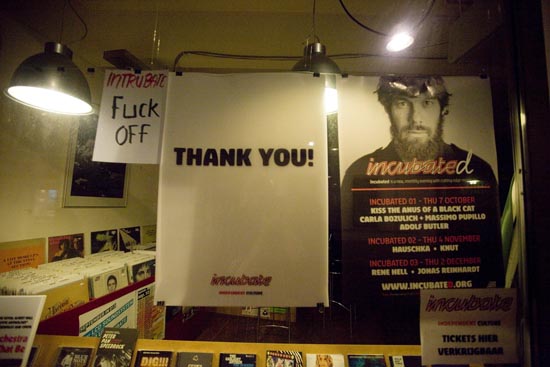Friday afternoon, and Incubate’s Piracy in Music conference is in full swing. The intrepid members of the Quietus team – me with notebook, Jonny Mugwump on audio (he’s recording for his Resonance FM show, the Exotic Pylon – this is the Incubate Pylon radio show), and Stu Green, photos – are sitting moonily in the arts cinema where Hank Shocklee, Bomb Squad supremo, is discussing the complex relationship between sampling and piracy. His argument – that artists should play a greater role in determining the resale value of their music, and its potential for repurposing at the hands of others – prompts a wave of responses from the audience around the purpose of copyright law. Jonny and I are scribbling notes back and forth about samples as hungry ghosts; Stu creeps down to get some shots. Joost, one of the festival organisers, says to me quietly: “People talk a lot about the effect of piracy on the market, but they talk on behalf of artists. No one ever asks the artists themselves, and we think that’s where you should start. So we decided to ask them.”
Ah, Incubate. Attending this week-long avant-garde-populist multimedia bonanza is a little like that scene in Annie Hall where Woody Allen produces Marshall McLuhan to clear up a disagreement he’s having in the cinema queue. The current issues facing the music industry, its innovators and extremists, its emerging genres and subgenres, are all represented here: to ask is to be answered. If you can dance to music you don’t know, if you can stomach the possibility of not already owning the first two albums, if you’re tired of the faux-eclectic ‘one black artist, one improv band, one woman singer songwriter’ bill that’s been passing for musical diversity of late, then here’s where you’ll find something that might genuinely surprise and delight. The music bill boasts heartshaking noise, doom, drone, Krautrock and witch house, hauntologia and hypnagogia, black metal and bewitching pop alongside rave, hip-hop, dubstep and wobble. And that’s just the one art form – photography, writing, film, tattoo art, and installation are also represented, in a bewildering variety of bars, arts centres, cinemas, record shops, warehouses, fields, farms and forests across Tilburg and its rural surroundings.
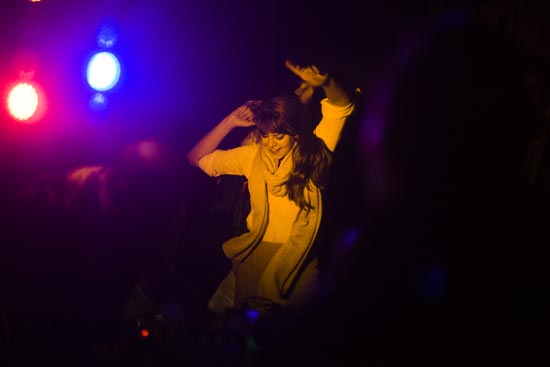
To be truthful, Incubate is more than a festival: it’s a form of arts activism, the equivalent of a Ladyfest or a Queeruption, but based on a liberal arts ethos rather than any specific political identity. Incubate genuinely believes in the power of the arts to refine the fabric of public life (see here). On the Sunday, the team is a little disheartened to find that the local paper has published poll results (ah, the tabloid internet poll) revealing that Incubate is thought of by locals as elitist. We find them at the bar, discussing the implications. “But the party is one of the oldest forms of democratic activity,” says Joost. “Durkheim argued that partying is an ancient way for whole communities to resolve tensions that prevent them making decisions for the benefit of all. It’s part of what we’re trying to do with our arts residencies: make links between progressive art forms and progressive social forces.” It’s true that, for the duration of the festival, municipal, public, rural and even ecclesiastical spaces are repurposed towards the radical party that the Incubate team has imagined into being; wandering from venue to venue, back and forth across the city, gives the impression of a net being woven, a collective effort (borne out by gestures such as the rollerblade street protest and the artist-designed Incubate tattoos available free all weekend). But at the heart of Incubate is a set of performances that, in the course of the festival, cover more emotional and philosophical ground than any festival I’ve known before. Here are some of them.
Mordant Music/ Vindicatrix
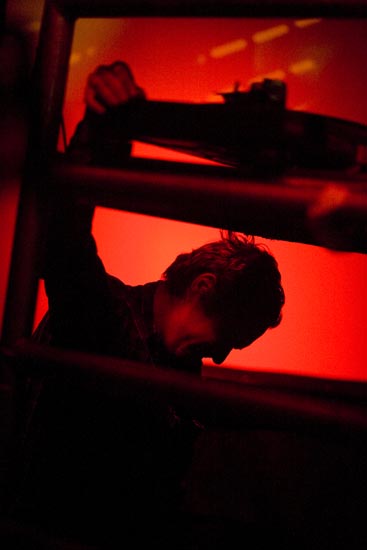
Baron Mordant, impresario of Mordant Music, is in the building. Romanticism is the theme of the evening, and this is all his fault: glown red, the warehouse shakes with sly schaffel, trance and pop, time-shifted and manipulated to queasy effect by an increasingly emotional Baron. If this is inexplicable, what follows is surreal: a shy English teenager layers his impressive baritone, reminiscent of Scott Walker and Billy Mackenzie, over spare and polished techno, adding intensely trebly treated samples from New Romantic pop and full orchestral stabs. “The host of holy symbols is inverted,” he intones sincerely, throwing things. He has what can only be described as a circuit-board cougar shirt on, tucked into high-waisted trousers. This is Vindicatrix, Mordant Music’s most recent addition, and his Coil-y theatrics are more engaging than mere description allows. The highlights of the set are his version of a Schumann piece, a retelling of a Scottish folk song (“I leave out the last verse,” he confides to me afterwards, “I don’t like singing the bit about killing my mum”), and a stunning cover of Michael Jackson’s ‘Human Nature’, which brings all three of the Quietus team to our knees. I’ve never noticed the spectral nature of the song’s textures and themes before: “electric eyes are everywhere,” seriously? From somewhere in the surrounding redness, I hear Baron Mordant screaming about genius and pain and love. He’s not kidding.
Bomb Squad
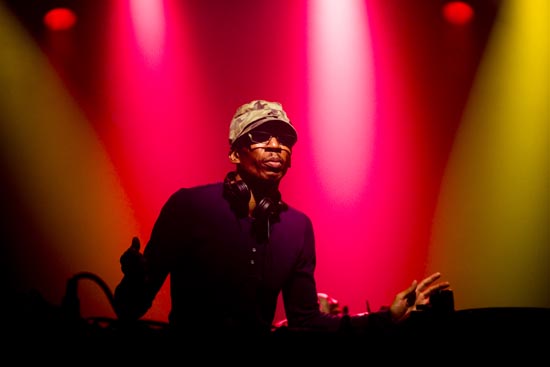
Fresh from a grilling at the Piracy in Music conference, Hank Shocklee – one half of astonishing producer-performer team the Bomb Squad – is serving up a glorious set of dense, sample-heavy breaks. Both Jonny and Stu are completely lost to it, Jonny jumping up and down in front of the decks screaming and gunfingering, Stu attempting a tricky locking/photography combo. At the start of the set, the familiarity of the samples is almost a detriment to movement: I keep flipping out at the sheer influence and reach of the man. I’m not alone, either – plenty of heads are being clutched. But as the night progresses, the ghosts of hip-hop past subside, first into remixes and then into a wobble set that has the room falling happily all over itself. Which way was up again?
Action Beat

A rarity on this bill, Action Beat’s stop-start Part Chimpy goodness boasts the standard white boys with guitars lineup, but seemingly multiplies it by π. The level of activity is so intense that it’s genuinely hard to determine who’s doing what, whether in apparent disarray or the kind of ringing unison that turns the human skull into a tuning fork. Three drummers, four guitarists and a bassist who dances like Guy Picciotto later, I realize I am in the presence of a party band; I’m just not sure they’re all at the same party. “It’s great to be here in Belgium,” enthuses one of the guitarists, then plays the guitar with his face. Everyone forgives him instantly.
Circle
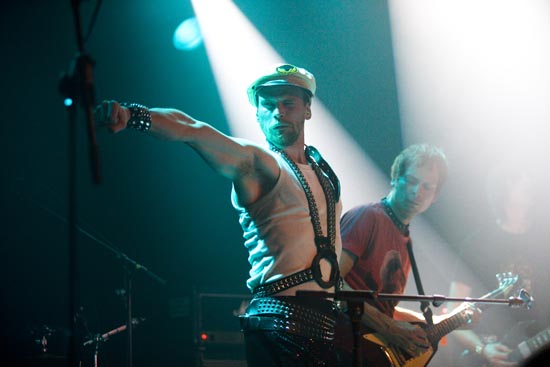
This much-beloved Finnish band’s bizarre blend of spacerock, power metal and gay performance art visibly wins the heart of every local homosocial indie kid. Circle’s tales of the unexpected draw from a deep affection for metal’s absurdities – Priestisms and Maidenisms abound – and so find strength there, rather than an ironic weakness. Even on a small stage, there’s an odd dignity to their insistence on overkill. At one point singer/keyboardist Jussi is brought low by a guitar used as an axe, collapses to the floor, then, fed blood from an egg, rises again, staring fiercely, brandishing… a harmonica! After each song he breaks character to grin at the roaring audience. For some reason that makes everything even better. Also: I think I saw him at the outdoor screening of Trapped In The Closet, wrapped in a blanket with a cup of tea, singing along.
DJ Dog Dick/ Sewn Leather/ Dan Deacon/ Jimmy Joe Roche (Glocal project)
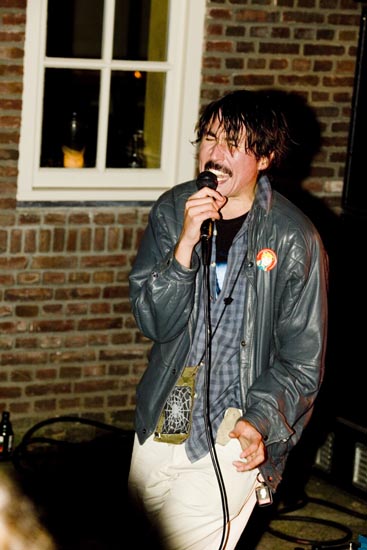
It’s fucking FREEZING out here. We’re in Hilvarenbeek, on an organic ecofarm outside of Tilburg, watching a film collaboration between Dan Deacon, Jimmy Joe Roche and Tilburg singers, artists and farmers (see here). Deacon and Roche have been on a three-week artist residency, living and working on this farm, exploring Brabant culture and tradition, and finding synergies between the progressive ethos of the farmers and their own ideas about collectivism and localism (Deacon and Roche are members of the Wham City arts collective). This is one of four such projects Incubate have funded this year, the other three being the Black Mountain performance in local forest venue Natuurtheater Oisterwijk, Ben Chasny’s concept album based around Brabant’s Maryan chapels, and Dutch artist Jeroen Doorenweerd’s new work Ghost Performance.
The film itself is a short, simple piece using local performers and the staff of the organic farm to build, and then playfully dispute, an idea of the essential nature of the land they’re working. It’s beautiful to look at, but there’s not yet enough of it: I need to know more about the farm’s philosophy, and how it finds its fit with Deacon and Roche’s sweet-natured collectivism. Following the film, however, there is a thematic lapse in attention: Deacon introduces performances from Sewn Leather, whose frankly frightening take on gabba is enhanced by his propensity for grabbing members of the audience and screaming in our faces about needing some crack, and DJ Dog Dick, a Baltimore noise artist, perhaps less directly confrontational but no less sonically challenging. Hiding amongst the hay bales in the barn, I’m having trouble grasping quite what it is about this place that is reflected in either of these performances, but all such doubts are swiftly dispelled once Deacon takes the – well, trestle table, and begins his usual mix of hig-nrg cartoon gospel and audience participation.
Deacon’s populism is, yes, simplistic, but it’s also incredibly moving and effective, particularly in this setting and micropolitical context. Watching a grey-haired farm worker put the crowd through its paces in the dance-off section inexplicably brings tears to my eyes, and when, halfway through the two-hour set, Jonny – a former rave bunny who’s never seen Deacon before – grabs me and yells “THIS IS IT! I HAVEN’T FELT LIKE THIS IN TEN YEARS!”, I know exactly what he means. I see Stu trying to take photos, but not able to stop dancing for long enough. I find myself yelling the words to ‘Wham City’, jumping up and down, screaming with joy, hugging my neighbour, trusting those around me. And at the end of the night, when the three of us lose the coach and find ourselves stranded in the icy pitch black of Hilvarenbeek, a giant white Cadillac appears beside us like a ghost. And we get in. And it takes us home.
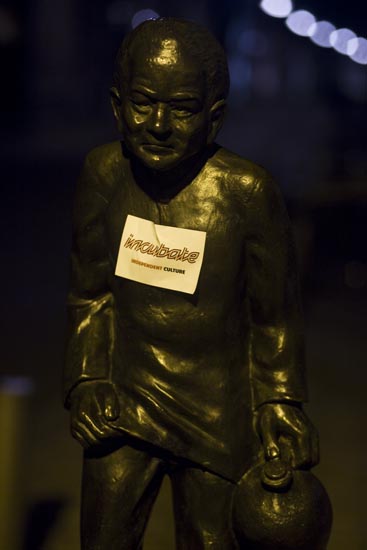
Kaya King
This British female noise duo doesn’t have an easy time of it in the record store: their equipment – a bass, used as a noise generator, a strange-looking electric crank, an aging keyboard and an array of mixers – seems set on failing. But their idiosyncratic improvised noise survives, sounding like old computer games left dying in an abandoned factory.
**Jason Urick***
Jason and I are talking about Dan Deacon last night. How easy it should be, I say, to make music that unites people, and how rare, how rare it is. “The interesting thing about Dan,” says Jason, “is that every single sound he uses, every tone, every sample, is totally soft and accessible. He just uses them at ultravolume. And it’s incredible the effect that has.”
Oh my god, that’s it.
“Whereas I,” he chuckles, flicking his cigarette butt into the road, “use exclusively aggressive, harsh sounds, and then treat them quietly. Maybe that’s why I’m not having much fun playing live at the moment.”
It doesn’t show. His set is beautiful. Yes, all the sounds were already in the red when he found them; yes, he is hard to understand, and maybe overwhelming; but he maps out his crisis point, extends it, until there is nothing frightening left, and the sounds are still there. Sounds like guardian angels.
Four to watch…
One of the loveliest things about Incubate is its stalwart support of local arts and culture. In that same happy spirit, please to find below a handful of the Dutch acts whose Incubate sets stole our slutty hearts.
Eklin
Trickling found sounds and live percussive performance from Eklin, an ambient five-piece centred around sound collagist Michiel Klein that ranks alongside the best of recent witch house for chills, though their infinitesimal shudder and glitch is also absorbingly lovely, reminiscent of arch-soundscapers Pram. The barely-perceptible chanted falsetto of singer Leontien Herkelman stitches together scattered scraps of sound-objects, as flickering and degraded home movies reveal the infinite threat just beyond everyday experience. Currently on US tour, album due in November, and soon to break here. Seek them out.
I Am Oak
Singer-songwriter Thijs Kuijken mines the tender understatement of Low and Smog for this intricate fare, which manages to include chorale, banjo, and brass and organ samples without the treacly overkill of Sufjan Stevens. Referential though the work may be, there’s a coherence of aesthetic and vision which purposefully unites the whole, and live in particular, with the full band on stage, I Am Oak are capable of the kind of quiet majesty to which their name aspires. Current album, On Claws, out on Snowstar Records. listen here.
Bebe Fang
Funereal and beautiful, Bebe Fang’s pared-down beats/treated vox/accordion mix is evocative of Goldfrapp or Broadcast, though this is stranger and scanter fare than either. Vocalist Berber Visser somehow channels the longing of the chanson and the ritual solemnity of the chant. Her voice is stunning untreated, raw, tough and ticklish: treated, it becomes impressionistic, and keyboardist Keimpe Koldijk manipulates it with painterly care. EP out now, sample Bebe Fang here
Edgar Wappenhalter
Extremely odd minimal lo-fi post-noise from the Sylvester Anfang II knob-twiddler, somewhat reminiscent of UFOmammut at their farthest out. The aesthetic seems to be spacerock with the rock removed – texturally at sea, shakily expansive, deranged and somehow sad: a phantom limb pointing. The grand gestures of Hawkwind and Amon Duul are hinted at with the slightest of sound references, but somehow dominate by their absence. There’s a sense of cinema to the sampling, too, which allows for further absorption in an already sensorily engrossing landscape. Imbibe here.
